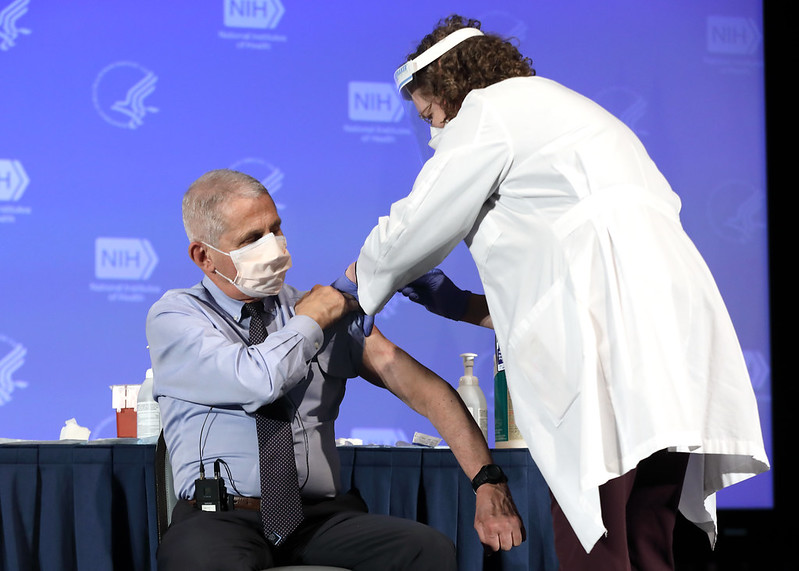Press release
Wednesday, December 30, 2020
Data from the Phase 3 clinical trial confirm that the vaccine is effective.
what
The experimental vaccine known as mRNA-1273 was 94.1% effective in preventing 2019 symptomatic coronavirus disease (COVID-19), according to preliminary results from a Phase 3 clinical trial reported in New England Journal of Medicine. The vaccine has also been shown to be effective in preventing severe COVID-19. The investigators identified no safety concerns and no evidence of vaccine-associated enhanced respiratory disease (VAERD).
The vaccine was co-developed by Moderna, Inc., a biotechnology company based in Cambridge, Massachusetts, and by the National Institute of Allergy and Infectious Diseases (NIAID), part of the National Institutes of Health. Moderna and NIAID previously shared the initial results of the COVE study. On December 18, 2020, the FDA issued an Emergency Use Authorization allowing Moderna to make the vaccine available for the prevention of COVID-19 in adults in the United States.
The study was conducted by principal investigators Lindsey R. Baden, MD at Brigham and Women’s Hospital in Boston, Hana M. El-Sahly, MD at Baylor College of Medicine in Houston, and Brandon Essink, MD, of Meridian Clinical Research. The test was implemented under the United States government’s Operation Warp Speed program and supported by NIAID and the Advanced Biomedical Research and Development Authority (BARDA) of the Office of the Assistant Secretary for Preparedness and Response in the Department of Health and Human Services.
The trial began on July 27, 2020 and enrolled 30,420 adult volunteers in clinical research centers in the United States. Volunteers were randomly assigned 1: 1 to receive two doses of 100 micrograms (mcg) of the experimental vaccine or two doses of saline placebo 28 days apart. The average age of volunteers is 51 years. Approximately 47% are women, 25% are 65 or older and 17% are under 65, with medical conditions that put them at greater risk for severe COVID-19. Approximately 79% of participants are white, 10% are black or African American, 5% are Asian, 0.8% are American Indians or Alaskan natives, 0.2% are Hawaiian natives or other Pacific islands, 2% are multiracial and 21% (of any race) are Hispanic or Latino.
From the start of the study until November 25, 2020, researchers recorded 196 cases of symptomatic COVID-19 occurring among participants at least 14 days after receiving their second injection. One hundred and eighty-five cases (30 of which were classified as severe COVID-19) occurred in the placebo group and 11 cases (0 of which were classified as severe COVID-19) occurred in the group that received mRNA-1273. The incidence of symptomatic COVID-19 was 94.1% lower in participants who received mRNA-1273 compared to those who received placebo.
The researchers observed 236 cases of symptomatic COVID-19 among the participants, at least 14 days after receiving their first injection, with 225 cases in the placebo group and 11 cases in the group that received mRNA-1273. The vaccine’s effectiveness was 95.2% for this secondary analysis.
There were no safety concerns of concern with vaccination, according to the authors. Local reactions to the vaccine were generally mild. About 50% of participants who received mRNA-1273 experienced moderate to severe side effects – such as fatigue, muscle pain, joint pain and headache – after the second dose, which disappeared in most volunteers in two days.
The researchers also found no evidence of VAERD among those who received mRNA-1273. This rare complication was observed in individuals vaccinated with a fully inactivated respiratory syncytial virus (RSV) vaccine in the 1960s, before there was the ability to define protein structures and measure immune responses with precision. VAERD can occur when a vaccine induces an immune response that is not strong enough to protect against infection.
Although mRNA-1273 is highly effective in preventing symptomatic COVID-19, there is still insufficient data available to draw conclusions about whether the vaccine can impact the transmission of SARS-CoV-2. Preliminary trial data suggest that there may be some degree of prevention of asymptomatic infection after a single dose. Additional analyzes are underway on the incidence of asymptomatic infection and post-infection viral spread to understand the vaccine’s impact on infectivity.
The authors concluded by discussing the unprecedented efficiency of candidate vaccine development, noting, “this process demonstrates what is possible in the context of motivated collaboration between key sectors of society, including academia, government, industry, regulators and the community at large” .
Article
LR Baden, et al. Efficacy and safety of the mRNA-1273 SARS-CoV-2 vaccine. The new English medical journal. DOI: 10.1056 / NEJMoa2035389.
Who
NIAID director Anthony S. Fauci, MD is available to comment on this study. John R. Mascola, MD, director of the NIAID Vaccine Research Center, is also available for comment.
Contact
To schedule interviews, contact the NIAID News & Science Writing Branch, (301) 402-1663, [email protected].
NIAID conducts and supports research – at NIH, the United States and around the world – to study the causes of infectious and immune-mediated diseases and to develop better ways to prevent, diagnose and treat these diseases. Press releases, fact sheets and other NIAID-related materials are available on the NIAID website.
About the National Institutes of Health (NIH):
NIH, the country’s medical research agency, includes 27 institutes and centers and is a component of the United States Department of Health and Human Services. NIH is the leading federal agency that conducts and supports basic, clinical and translational medical research, and is investigating the causes, treatments and cures for common and rare diseases. For more information about NIH and its programs, visit www.nih.gov.
NIH … Transforming discovery into health®
